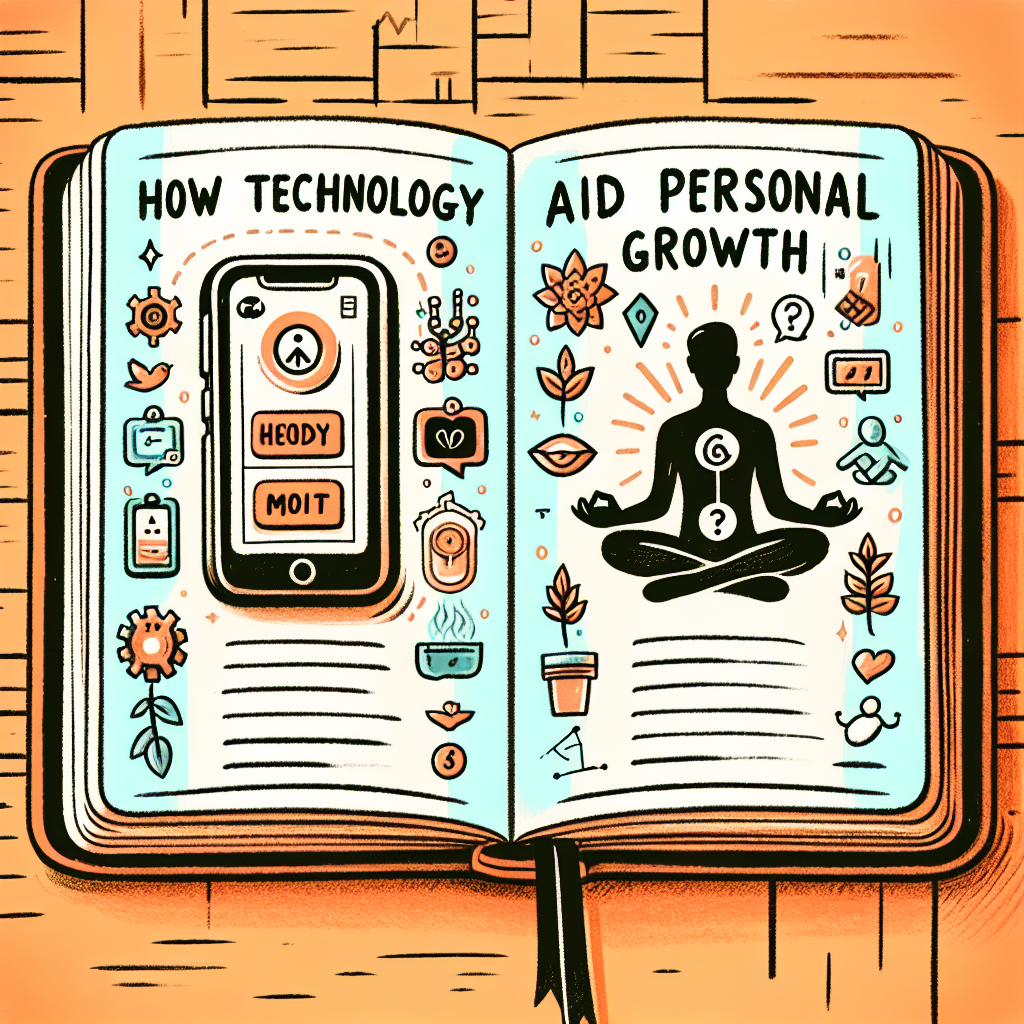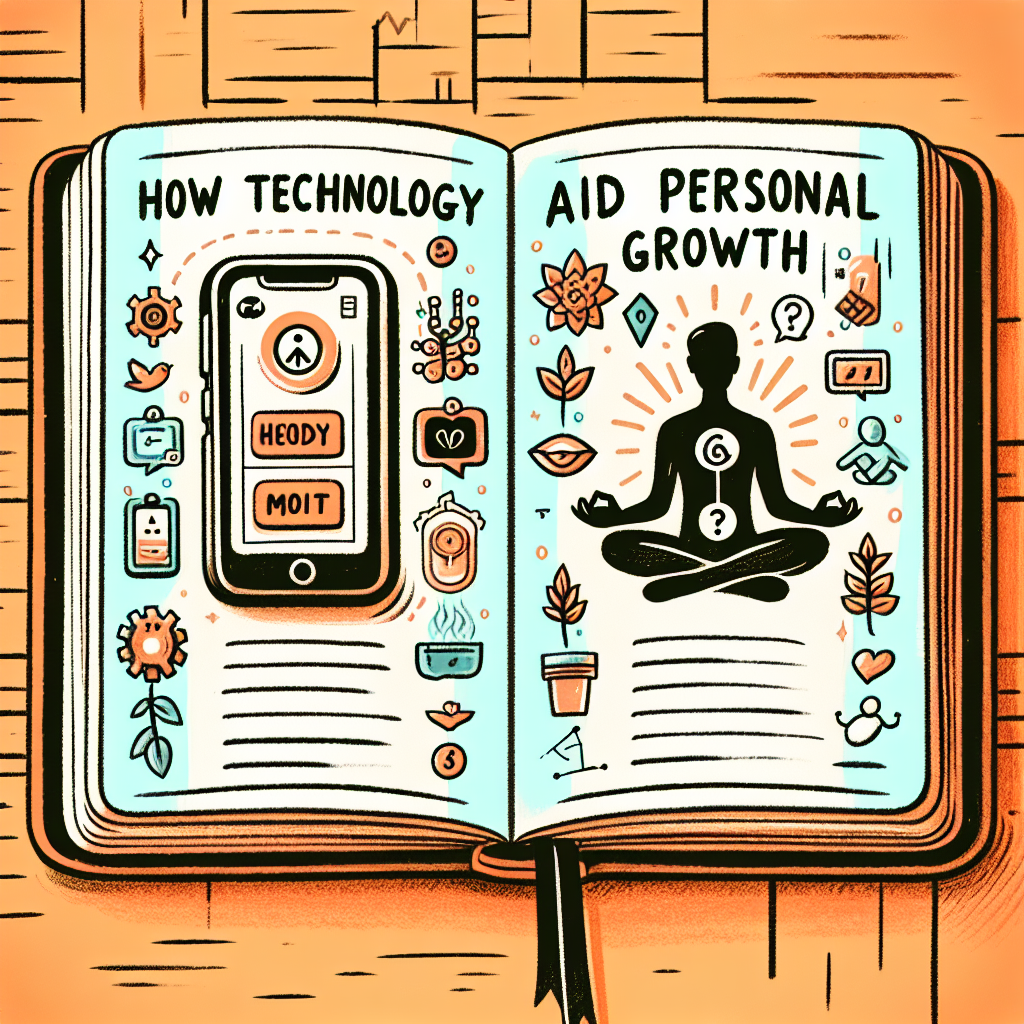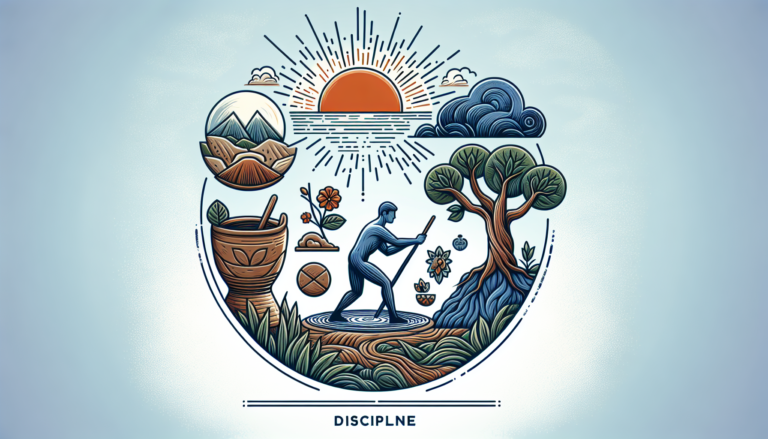How Technology Can Aid Personal Growth
In a fast-paced world driven by technological advancements, it’s easy to overlook the potential for technology to aid personal growth. However, amidst the endless distractions and constant connectivity, there lies a vast array of tools and resources that can empower you to embrace change, expand your horizons, and cultivate a growth mindset. From educational apps that foster continuous learning to meditation apps that promote mental well-being, technology has the transformative power to enhance various aspects of your personal development journey. In this article, we explore the ways in which technology can be harnessed as a valuable companion on your path to self-improvement and personal growth.

Enhancing Learning and Education
In today’s digital age, technology has revolutionized the way we learn and access educational resources. With just a few clicks, you can now have access to a vast range of educational materials, from textbooks and articles to videos and podcasts. The internet has opened up endless possibilities for self-directed learning, allowing you to explore any topic or subject that interests you.
Online courses and e-learning platforms have also become increasingly popular, offering a convenient and flexible way to acquire new knowledge and skills. These platforms provide interactive lessons, quizzes, and assignments that enable you to learn at your own pace, in the comfort of your own home. Whether you want to learn a new language, develop coding skills, or enhance your professional expertise, there are countless online courses available to cater to your specific needs and interests.
One of the key benefits of technology in education is the ability to personalize your learning experience. Many e-learning platforms and educational apps use algorithms and data analysis to tailor their content to your individual needs and learning style. This means that you can receive personalized recommendations for courses and resources that are most relevant to you, helping you to make the most of your learning journey.
Technology also presents opportunities for collaborative learning, allowing you to connect with peers and experts from around the world. Online discussion forums, virtual classrooms, and social media platforms provide spaces for engaging in meaningful discussions, sharing ideas, and collaborating on projects. This not only enhances your understanding of the subject matter but also develops your teamwork and communication skills.
Improving Time Management and Productivity
In today’s fast-paced world, effective time management is crucial for success and personal growth. Thankfully, technology offers a wide range of tools and apps to help you stay organized and boost your productivity.
Task and project management tools are invaluable for keeping track of your to-do list and ensuring that you meet deadlines. These tools allow you to break down your tasks into smaller, manageable steps, set priorities, and allocate time and resources accordingly. With features like reminders and notifications, you can stay on top of your tasks and complete them in a timely manner.
Digital calendars and reminders are also essential for managing your schedule and appointments. With the ability to sync across devices, you can access your calendar from anywhere, ensuring that you never miss an important meeting or deadline. These tools can also send you reminders and notifications, helping you stay organized and on track.
To improve your overall productivity, there is a wide range of apps and software available. From time-tracking apps that help you analyze how you spend your time, to productivity apps that block distracting websites and track your progress on tasks, these tools provide valuable insights into your productivity habits and help you make necessary adjustments.
The rise of remote work and flexible working arrangements has also been enabled by technology. With the ability to work from anywhere, you have the flexibility to design your schedule in a way that suits your personal preferences and maximizes your productivity. This remote work culture promotes a healthy work-life balance and encourages personal growth by allowing you to create a lifestyle that aligns with your goals and values.
Facilitating Mental Health and Well-being
In recent years, there has been a growing recognition of the importance of mental health and well-being in personal growth. Technology has played a significant role in providing access to resources and support for maintaining good mental health.
Meditation and mindfulness apps have gained popularity as effective tools for reducing stress, improving focus, and promoting overall well-being. These apps provide guided meditation sessions, breathing exercises, and relaxation techniques that can be accessed anytime and anywhere. By incorporating mindfulness practices into your daily routine, you can develop self-awareness, boost resilience, and achieve a greater sense of inner peace.
For those seeking professional support, online therapy and counseling platforms offer a convenient and accessible solution. These platforms connect you with licensed therapists and counselors who provide confidential counseling sessions via video calls or text-based messaging. This not only breaks down geographical barriers but also eliminates the stigma often associated with seeking help for mental health issues.
Virtual support communities have also emerged as valuable resources for individuals facing mental health challenges. Online forums, support groups, and social media communities provide a safe and anonymous space for people to share their experiences, seek advice, and offer support to others in similar situations. These virtual communities foster a sense of belonging and solidarity, promoting personal growth and resilience.
In addition to mental health, technology also supports physical well-being through health and fitness tracking devices. Wearable devices like fitness trackers and smartwatches enable you to monitor your daily activity levels, heart rate, sleep quality, and more. By having access to real-time data about your health and fitness, you can make informed decisions about your lifestyle and make positive changes to improve your overall well-being.
Promoting Personal Reflection and Self-awareness
Personal reflection and self-awareness are fundamental to personal growth, and technology offers a range of tools to facilitate this process.
Journaling and reflective writing apps provide a platform for you to express your thoughts, emotions, and experiences. These apps often have features like prompts and guided exercises to help you explore your feelings and gain deeper insights into yourself. By regularly engaging in reflective writing, you can gain clarity, process emotions, and identify patterns or areas for personal growth.
Emotional intelligence training has gained traction in recent years as a valuable skill set for personal and professional development. Technology provides interactive courses and workshops that enable you to learn about and develop emotional intelligence. These programs often include self-assessment tools, practical exercises, and feedback to help you cultivate self-awareness, empathy, and effective communication skills.
Self-tracking and self-assessment tools allow you to monitor various aspects of your life, from sleep patterns and exercise habits to mood and productivity levels. By collecting and analyzing this data, you can identify patterns and trends, understand your strengths and weaknesses, and make informed decisions about areas for improvement.
Virtual reality (VR) simulations have also emerged as a powerful tool for building empathy and understanding. VR experiences can transport you to different environments and perspectives, allowing you to see the world through someone else’s eyes. This immersive technology promotes empathy, compassion, and a deeper understanding of others, enhancing your personal growth and interpersonal skills.

Encouraging Goal Setting and Achievement
Setting goals is a crucial step in personal growth, and technology provides numerous tools and resources to support this process.
Goal tracking apps and software enable you to set specific, measurable, attainable, relevant, and time-bound (SMART) goals. These tools allow you to track your progress, set reminders, and receive notifications, helping you stay accountable and motivated. By breaking down larger goals into smaller milestones, you can celebrate achievements along the way and maintain momentum towards your ultimate goals.
Task automation and gamification are two strategies commonly employed to enhance goal setting and achievement. Task automation involves using technology to streamline and simplify repetitive tasks, freeing up time and mental energy for more meaningful endeavors. Gamification, on the other hand, incorporates game elements like challenges, rewards, and competition into goal-oriented activities, making them more engaging and motivating.
Personal development planning tools provide a structured framework for designing and pursuing your personal growth goals. These tools often include goal-setting templates, action plans, and progress trackers to help you stay focused and motivated. By creating a clear roadmap for your personal growth journey, you can ensure that you are continuously progressing towards your desired outcomes.
Visualizing and manifestation apps utilize visualization techniques and positive affirmations to help you manifest your goals and desires. By visualizing your goals and repeating affirmations, you can harness the power of your subconscious mind and create a positive mindset that aligns with your aspirations. These apps often include vision board features, where you can curate images and quotes that inspire and motivate you towards your goals.
Fostering Creativity and Innovation
Technology has opened up new possibilities for exploring and expressing creativity, allowing individuals to unleash their innovative potential.
Digital design and art apps provide a platform for creating and editing artwork, whether it’s illustrations, animations, or graphic designs. These apps offer a wide range of tools and features that enable you to experiment with different techniques, colors, and styles. This not only enhances your artistic skills but also promotes self-expression and creativity.
Collaborative idea generation platforms enable individuals to collectively brainstorm and develop innovative solutions to complex problems. By leveraging technology, these platforms foster collaboration and diversity of thought, allowing individuals from different backgrounds and perspectives to contribute their ideas. This promotes creativity, critical thinking, and the generation of novel solutions.
Virtual reality (VR) and augmented reality (AR) tools have revolutionized the way we create and experience art and design. VR and AR technologies enable artists and designers to create immersive and interactive experiences that engage multiple senses. This facilitates a deeper connection between the creator and the audience, fostering creativity, and pushing the boundaries of traditional art forms.
Computer-aided design (CAD) and engineering software have transformed the fields of architecture, engineering, and product design. These software tools allow individuals to create digital models, simulate physical properties, and test ideas before building prototypes. By leveraging these technologies, individuals can streamline the design process, iterate quickly, and bring their innovative ideas to life.
Improving Communication and Interpersonal Skills
Effective communication and interpersonal skills are essential for personal growth and success in all areas of life. Technology offers a range of tools and platforms to enhance these skills.
Video conferencing and webinar platforms enable individuals to connect and communicate face-to-face, regardless of geographical location. These platforms facilitate virtual meetings, presentations, and collaborations, allowing individuals to engage in real-time conversations and build relationships. This is particularly valuable for remote work, international collaborations, and professional networking.
Language learning apps and programs have made language acquisition more accessible and interactive than ever before. These apps offer a variety of tools and resources, such as vocabulary drills, pronunciation practice, and language exchange platforms. By leveraging technology, you can develop your language skills at your own pace and connect with native speakers around the world.
Virtual networking and professional communities provide opportunities to expand your professional network and connect with like-minded individuals. Social media platforms, online forums, and professional networking platforms allow you to showcase your skills, exchange ideas, and receive valuable feedback. These virtual communities foster collaboration, mentorship, and career growth.
Emotional intelligence and communication training programs use technology to provide interactive and immersive learning experiences. These programs often include simulations, role-playing exercises, and feedback mechanisms to help you develop effective communication skills, empathy, and self-awareness. By honing your emotional intelligence, you can build stronger relationships, resolve conflicts, and navigate challenging situations with ease.
Enhancing Critical Thinking and Problem Solving
Critical thinking and problem-solving skills are essential for personal growth and success in today’s complex world. Technology offers a range of tools and resources to support the development of these skills.
Online research and information access have become integral parts of the learning process. With just a few clicks, you can access a wealth of information and resources on any topic. Online libraries, databases, and academic journals provide credible sources that can be explored and analyzed to develop critical thinking skills. By evaluating information, identifying biases, and synthesizing knowledge from various sources, you can cultivate a strong foundation for critical thinking and problem-solving.
Data analysis and visualization tools enable individuals to make sense of complex data and extract meaningful insights. With these tools, you can visualize data through charts, graphs, and interactive dashboards, allowing for a deeper understanding and interpretation of patterns and trends. By developing data literacy and analytical thinking skills, you can make informed decisions, solve problems, and identify opportunities for improvement.
Virtual simulations and gamified learning offer immersive and interactive experiences that allow individuals to practice critical thinking and problem-solving in a realistic context. Whether it’s a flight simulator for pilot training or a business simulation for strategic decision-making, these virtual environments provide a safe space for experimentation and learning from mistakes. By engaging in virtual simulations, you can develop problem-solving skills, improve decision-making, and build resilience.
Coding and programming practices have gained popularity as effective tools for developing logical thinking and problem-solving skills. Through coding exercises and projects, individuals learn to break down complex problems into smaller, manageable steps and develop algorithms to solve them. Coding also fosters creativity and innovation by enabling individuals to bring their ideas to life through technology.
Supporting Personal Growth through Mentorship
Mentorship is a powerful tool for personal growth, and technology has made it easier than ever to access mentorship opportunities.
Online mentorship platforms connect individuals seeking guidance and mentorship with experienced professionals from various fields. These platforms provide a space for mentees to connect with mentors who can offer insights, advice, and support. Through virtual meetings, email exchanges, or mentoring programs, mentors can share their knowledge, wisdom, and expertise, guiding mentees on their personal growth journey.
Guidance and coaching apps offer personalized support and resources for personal growth. These apps provide self-assessment tools, goal-setting frameworks, and actionable strategies to help individuals overcome obstacles and unlock their full potential. With features like progress tracking and reminders, these apps enable individuals to stay motivated and accountable in their personal growth pursuits.
Virtual mentor networks are online communities that bring together mentors and mentees with shared interests and goals. These networks facilitate connections, peer learning, and mentorship opportunities within a specific industry or niche. By joining a virtual mentor network, you can expand your network, gain valuable insights, and receive guidance from individuals who have walked a similar path.
Self-learning and resource discovery tools are invaluable for personal growth. Online platforms, podcasts, and educational websites offer a wealth of educational resources, including articles, books, videos, and courses. By leveraging these tools, you can take ownership of your learning journey, explore new topics, and discover resources that align with your personal growth goals.
Promoting Global Connectivity and Cultural Understanding
Technology has made the world a smaller place, promoting global connectivity and fostering cultural understanding.
Language translation and localization tools break down language barriers, allowing individuals to communicate and connect with people from different cultures and backgrounds. With real-time translation apps, language learning platforms, and localization services, you can engage in meaningful conversations and bridge the communication gap. This promotes cultural understanding, empathy, and the exchange of ideas.
Virtual travel and cultural experiences provide opportunities to explore different countries and cultures from the comfort of your own home. Virtual reality (VR) and augmented reality (AR) technologies enable you to virtually visit iconic landmarks, experience cultural festivals, and interact with people from around the world. By immersing yourself in these virtual experiences, you can develop a deeper appreciation and understanding of different cultures.
Online cultural exchange programs foster connections and promote cultural understanding between individuals from different countries. These programs often involve language exchanges, virtual classrooms, and collaborative projects that enable participants to learn about and appreciate each other’s cultures. By engaging in these programs, you can enhance your cultural competence, develop empathy, and build cross-cultural relationships.
Social media and online community engagement have opened up new avenues for connecting with individuals from diverse backgrounds. Through platforms like Facebook, Twitter, and Instagram, you can join online communities, follow pages and profiles, and engage in conversations with people from all over the world. This not only exposes you to different perspectives but also allows you to share your own experiences and contribute to global discussions.







